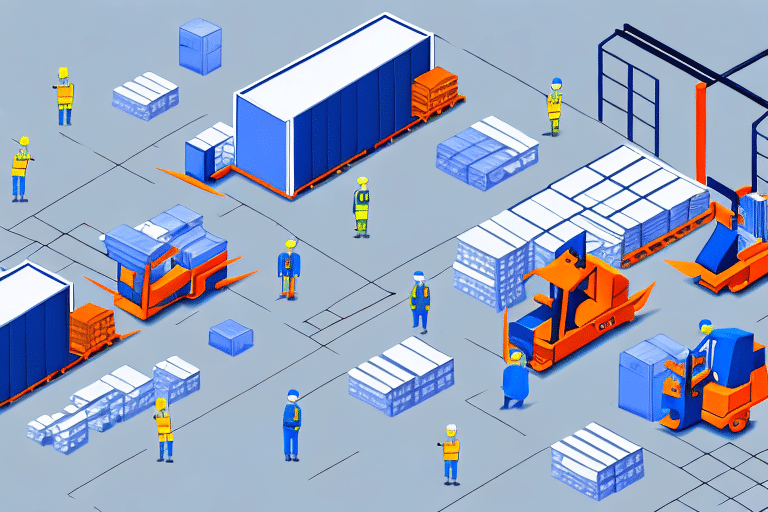The 101 on 3PL Providers: What They Are and How They Work
If you’re involved in the world of logistics and transportation, you’ve probably heard of third-party logistics (3PL) providers. But what exactly are they, and how do they function? In this comprehensive article, we’ll delve into the realm of 3PL providers and explore everything you need to know about these logistics experts.
Understanding the Basics of Third-Party Logistics (3PL) Providers
At its core, 3PL refers to companies that offer comprehensive logistics services to businesses. These services encompass transportation, warehousing, distribution, and more. Essentially, 3PL providers manage a company’s logistics operations, allowing businesses to focus on their core competencies.
One of the primary advantages of partnering with a 3PL provider is the ability to scale operations efficiently. As a business grows, its logistics needs become more complex, requiring additional resources. A 3PL provider enables businesses to expand their logistics operations without significant investments in infrastructure or personnel, which is particularly beneficial for small and medium-sized enterprises.
According to a report by Statista, the global 3PL market is expected to grow significantly, highlighting the increasing reliance on these providers in the modern supply chain.
The Evolution of 3PL Providers: From Freight Forwarders to Logistics Experts
The 3PL industry has transformed dramatically since its inception in the 1970s, initially focused on freight forwarding. Today, 3PL providers offer a broad spectrum of logistics services and are recognized as experts in the field. The complexities of modern global business and the rise of e-commerce have driven the demand for more sophisticated logistics solutions.
Technological Advancements Driving Change
Technology is a key driver in the evolution of 3PL providers. Innovations such as artificial intelligence (AI), machine learning, and the Internet of Things (IoT) have enabled 3PLs to offer more advanced and customized solutions. For instance, IoT sensors facilitate real-time shipment tracking, enhancing visibility and control over the supply chain.
Research from McKinsey & Company highlights how digital transformation is reshaping logistics, allowing 3PL providers to optimize operations and improve service delivery.
Sustainability as a Core Focus
Another significant trend in the 3PL industry is the emphasis on sustainability. Businesses increasingly seek logistics partners that can help minimize their environmental impact. 3PL providers are responding by implementing green logistics solutions, such as using electric vehicles for transportation and optimizing delivery routes to reduce fuel consumption.
The World Bank reports that sustainable logistics practices not only benefit the environment but also enhance operational efficiency and reduce costs.
The Types of Services Offered by 3PL Providers
3PL providers offer a diverse array of logistics services tailored to meet various business needs. Some of the most common services include:
- Transportation: Managing the movement of goods via road, rail, air, or sea.
- Warehousing: Storing goods in strategically located facilities.
- Distribution: Ensuring timely delivery of products to end customers.
- Freight Forwarding: Coordinating the shipment of goods across international borders.
- Inventory Management: Monitoring and controlling stock levels to meet demand efficiently.
Additionally, many 3PL providers offer value-added services such as packaging, labeling, and assembly, which are crucial for businesses requiring customized product handling before distribution.
Supply Chain Consulting
Beyond operational services, some 3PL providers offer supply chain consulting. This involves analyzing and optimizing a company’s supply chain processes to enhance efficiency, reduce costs, and improve overall performance. Leveraging their industry expertise, 3PL consultants can identify bottlenecks and implement strategic improvements.
Studies from the Harvard Business Review indicate that supply chain optimization can lead to significant cost savings and increased customer satisfaction.
Benefits of Using a 3PL Provider for Your Business Operations
Outsourcing logistics to a 3PL provider offers numerous advantages:
- Focus on Core Competencies: Businesses can concentrate on their primary activities while leaving logistics management to experts.
- Cost Reduction: Leveraging a 3PL’s resources and expertise can lead to lower operational costs.
- Access to Advanced Technology: 3PL providers often use sophisticated software and technologies that might be cost-prohibitive for businesses to implement independently.
- Scalability and Flexibility: 3PLs can easily scale services to accommodate business growth or seasonal fluctuations.
Moreover, partnering with a 3PL provider can enhance supply chain visibility and provide valuable data insights, leading to better decision-making and improved operational efficiency.
How to Choose the Right 3PL Provider for Your Business Needs
Selecting the appropriate 3PL provider is crucial for the success of your logistics operations. Consider the following factors when making your decision:
- Industry Expertise: Ensure the provider has experience in your specific industry and understands its unique logistics requirements.
- Service Offerings: Assess whether the provider offers the range of services you need, whether it’s transportation, warehousing, or specialized services.
- Technology Capabilities: Choose a provider that utilizes advanced technologies for real-time tracking, inventory management, and data analytics.
- Reputation and Reliability: Look for providers with a proven track record of reliability, timely deliveries, and excellent customer service.
- Cost Structure: Evaluate the provider’s pricing model to ensure it aligns with your budget and offers transparency without hidden fees.
- Scalability: The provider should be able to accommodate your business’s growth and evolving logistics needs.
It's also beneficial to seek providers that align with your company’s values, particularly regarding sustainability and customer service, to foster a strong and harmonious partnership.
The Role of Technology in 3PL Provider Operations
Technology is integral to the operations of modern 3PL providers, enabling them to optimize logistics processes and enhance service delivery. Key technological advancements include:
- Warehouse Management Systems (WMS): Advanced software solutions that streamline warehouse operations, including inventory tracking, order fulfillment, and shipping.
- Real-Time Tracking: GPS and IoT technologies allow for the real-time monitoring of shipments, providing greater visibility and control over the supply chain.
- Automation and Robotics: Automated systems and robotics improve efficiency in warehousing and order processing, reducing errors and labor costs.
- Data Analytics: Leveraging big data and analytics helps 3PL providers make informed decisions, predict demand trends, and optimize routes.
Enhancing Efficiency Through Automation
Automation plays a pivotal role in increasing the efficiency of 3PL operations. Automated order processing, robotic picking systems, and autonomous vehicles are examples of how technology reduces manual intervention, speeds up operations, and minimizes errors.
According to a report by Forbes, automation in logistics can lead to significant cost savings and improved operational efficiency.
Promoting Sustainability Through Technology
Technology also contributes to sustainability in logistics. 3PL providers are utilizing electric vehicles, energy-efficient warehouse systems, and data-driven route optimization to reduce their carbon footprint. These initiatives not only support environmental goals but also enhance operational efficiency by lowering fuel consumption and energy costs.
The U.S. Energy Information Administration emphasizes the importance of energy-efficient practices in reducing overall supply chain emissions.
Key Performance Indicators (KPIs) for Measuring the Success of Your 3PL Provider
Evaluating the performance of a 3PL provider is essential to ensure they meet your business’s logistics needs. Key Performance Indicators (KPIs) to consider include:
- On-Time Delivery: The percentage of shipments delivered on schedule is a critical measure of reliability.
- Inventory Accuracy: Accurate inventory management ensures that stock levels are maintained correctly, reducing overstocking or stockouts.
- Order Accuracy: Ensuring that orders are fulfilled correctly enhances customer satisfaction and reduces returns.
- Customer Satisfaction: Feedback from customers can provide insights into the overall quality of the logistics services.
Additionally, assess the provider’s ability to handle returns and reverse logistics efficiently. Effective management of returns can reduce costs and improve customer experience.
Technology and Systems Performance
Evaluate the technological infrastructure of the 3PL provider. Advanced systems that offer real-time visibility, automated reporting, and seamless integration with your own systems can significantly enhance supply chain management and decision-making.
Research from Supply Chain Digital suggests that robust technology systems are fundamental to measuring and improving logistics performance.
Trends and Innovations in the 3PL Industry to Watch Out For
The 3PL industry is continuously evolving, driven by technological advancements and changing market demands. Key trends and innovations to watch include:
- Growth of E-Commerce: The surge in online shopping has increased the demand for faster and more flexible logistics solutions, prompting 3PL providers to enhance their capabilities in last-mile delivery and fulfillment.
- Data Analytics and AI: Utilizing big data and AI for predictive analytics helps 3PL providers optimize routes, forecast demand, and improve operational efficiency.
- Sustainability and Green Logistics: Continued focus on environmentally friendly practices, such as using electric vehicles and optimizing supply chain routes to reduce emissions.
- Blockchain Technology: Blockchain offers enhanced transparency and security in supply chain management, streamlining processes and reducing costs.
- Automation and Robotics: Increased use of automation in warehouses and logistics operations to improve speed and accuracy.
- Customer Experience Enhancement: Providing more personalized and customized logistics solutions to meet the unique needs of clients.
The COVID-19 pandemic has further accelerated the digital transformation of the 3PL industry, with innovations like drones, autonomous vehicles, and virtual reality being integrated to enhance efficiency and productivity.
Case Studies: Successful Examples of Companies Leveraging 3PL Providers
Numerous companies have successfully partnered with 3PL providers to streamline their logistics operations and drive growth:
Adidas
Adidas collaborated with a 3PL provider to enhance its order accuracy and reduce shipping times. By leveraging advanced warehouse management systems and real-time tracking, Adidas improved its supply chain efficiency, leading to increased customer satisfaction.
IBM
IBM engaged a 3PL provider to optimize its global supply chain, resulting in significant cost reductions and improved operational performance. The collaboration allowed IBM to focus on its core technology services while relying on the 3PL for logistics expertise.
These case studies illustrate the tangible benefits that 3PL providers can offer, including enhanced efficiency, cost savings, and the ability to scale operations effectively.
Challenges and Risks Associated with Using a 3PL Provider and How to Mitigate Them
While partnering with a 3PL provider offers numerous benefits, it also comes with potential challenges and risks:
- Communication and Coordination Issues: Misunderstandings or lack of clear communication can lead to operational inefficiencies.
- Data Security Concerns: Sharing sensitive business information with a 3PL provider can pose data security risks.
- Unexpected Costs or Fees: Hidden charges can inflate logistics costs beyond initial projections.
To mitigate these risks, businesses should take the following steps:
- Select a Reputable Provider: Conduct thorough research and choose a 3PL with a proven track record and positive client reviews.
- Establish Clear Communication Protocols: Define roles, responsibilities, and communication channels to ensure transparency and accountability.
- Review Contracts Carefully: Scrutinize the pricing structure and terms to avoid unexpected fees and ensure alignment with business needs.
- Implement Data Security Measures: Ensure that the 3PL provider adheres to robust data protection standards and complies with relevant regulations.
Evaluating the Cost-Effectiveness of Outsourcing Logistics to a 3PL Provider
Assessing the cost-effectiveness of outsourcing logistics to a 3PL provider involves comparing the potential costs and benefits of outsourcing versus maintaining in-house logistics operations:
Cost Savings
Outsourcing can lead to significant cost reductions by eliminating the need for investments in infrastructure, technology, and personnel. 3PL providers often achieve economies of scale, passing on cost benefits to their clients.
Operational Efficiency
3PL providers bring expertise and advanced technologies that can streamline logistics operations, reduce errors, and enhance efficiency, resulting in lower operational costs.
Flexibility and Scalability
3PLs offer the flexibility to scale logistics services up or down based on business needs without incurring additional fixed costs, which is particularly advantageous during peak seasons or periods of growth.
Comparative Analysis
Businesses should conduct a thorough analysis comparing the total costs of outsourcing against in-house logistics, considering factors such as labor, equipment, technology, and potential cost savings from improved efficiency.
Consulting studies from sources like PwC can provide valuable insights into the financial implications of outsourcing logistics.
Future Outlook: Predictions for the Future of the 3PL Industry and Its Impact on Businesses
The 3PL industry is poised for continued evolution, influenced by emerging technologies, changing consumer behaviors, and global economic trends. Predictions for the future include:
- Increased Specialization: 3PL providers may focus on niche markets, offering specialized services tailored to specific industries or supply chain needs.
- Consolidation and Mergers: The industry may see more mergers and acquisitions as providers seek to expand their service offerings and geographic reach.
- Advanced Automation: Continued adoption of automation and robotics will further enhance efficiency and reduce labor costs.
- Enhanced Sustainability Efforts: Sustainability will remain a key focus, with 3PL providers implementing more eco-friendly practices and technologies.
- Integration of Blockchain: Blockchain technology will offer greater transparency, security, and efficiency in supply chain management.
These developments will likely have a profound impact on businesses, enabling more efficient, flexible, and sustainable logistics operations. Companies must stay abreast of these trends to leverage the full potential of their 3PL partnerships.
Conclusion
3PL providers play a critical role in modern logistics operations, offering businesses the expertise and resources needed to manage complex supply chains effectively. By outsourcing logistics to a reliable 3PL provider, companies can focus on their core competencies, achieve cost savings, and enhance operational efficiency. However, it is essential to carefully select a provider that aligns with your business needs and values while addressing potential challenges proactively. With the right partnership, leveraging a 3PL provider can lead to significant improvements in logistics performance and overall business success.




















